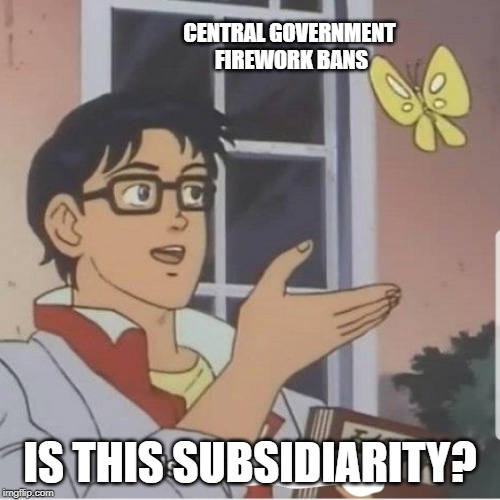Subsidiarity is the principle that different levels of government should handle the tasks for which they are best suited.
If you think about it with a bit of public economics in mind, you can see it as siting policy and regulation at the level that best internalises whatever externalities are at play. It makes little sense for central government to decide on whether a stop sign, traffic light, or roundabout is the best traffic management option in some local neighbourhood; local governments shouldn't run their own monetary policy.
The Initiative has been pushing for greater subsidiarity and better frameworks for aligning local council incentives. Councils frequently, and rightly, complain about unfunded regulatory mandates from central government that do not suit local conditions. And councils also operate under often tight capabilities constraints.
So a few bits at this week's Local Government New Zealand conference puzzle me.
Delegates at the conference voted to support a central government ban on the sale of fireworks. This could make sense if the cost of enforcing council-level bans on the use of fireworks were preventing councils from enacting their own bans in the places and times where the costs of fireworks are particularly high, but it doesn't immediately seem consistent with greater local control and subsidiarity.
The bigger and odder one though is Councils wishing remit over climate change policy.
Wellington City Council asks that LGNZ members collectively adopt the position that government should revise the Resource Management Act 1991 to adequately consider the impact of greenhouse gases when making decisions under that law and to ensure that the Resource Management Act 1991 is consistent with the Zero Carbon Bill.If prices are working properly in the ETS, there is no more need for councils to consider GHG reductions in consenting than there is need for councils to worry about whether the world is running out of lithium or helium or anything else. Anyone doing anything will have worked expected carbon prices into their own planning. Councils will need to think about it for stuff like whether to renew old coal boilers or upgrade to electric kit on their own properties, and they could think about it in forecasting demand for public transport once carbon prices become more binding, but they needn't check off any particular activity against a zero-carbon priority. It's already worked into the price - if central government is getting things right in strengthening the ETS.
The remit was passed with 64 per cent support of the sector.
Where councils regularly worry about unfunded mandates and where council capabilities can be binding constraints, adding carbon planning to their remit seems inconsistent with subsidiarity (the carbon price is better handled through national level trading where international trading isn't there yet) and with council complaints of needing more resource to be able to handle their necessary functions.
Hopefully central government does not accede to local government pressure here and rightly views it as inconsistent with government achieving its objectives around affordable housing. If new subdivisions get bogged down into arguments about whether they're consistent with zero-carbon mandates, when petrol is already in the ETS and so the carbon costs of transport are already in the system - madness that way lies.
Update: a slide on what that could involve.
James Palmer, CE of Hawkes Bay Regional Council #lgnz19 #lgnz2019 We are domestically and globally off track. We as local government are fundamental enablers #LGNZ19 #lgnz2019 Start with your communities and tangata whenua. They have the answers! #lgnz2019 #lgnz19 pic.twitter.com/4bxJnRYfXs— Kelly Stratford (@ranui_organics) July 7, 2019


No comments:
Post a Comment